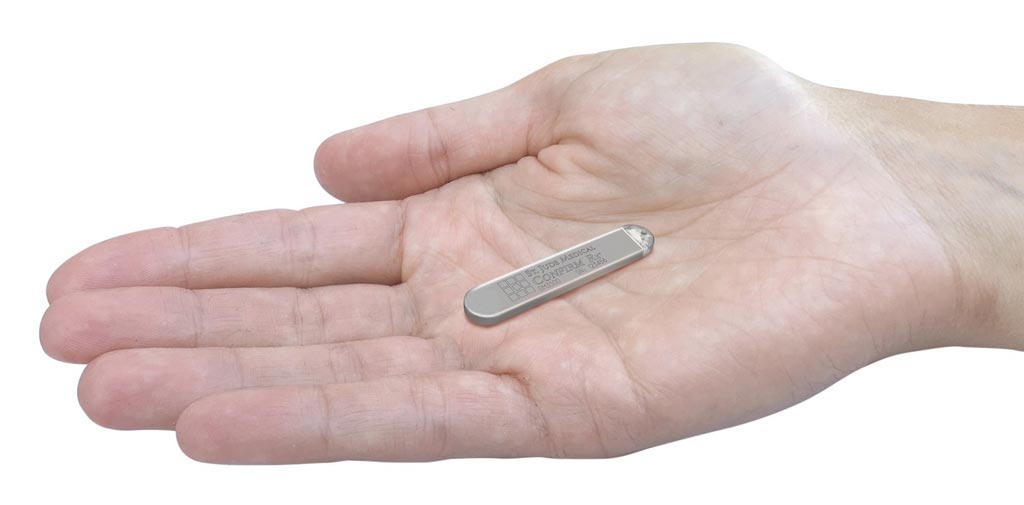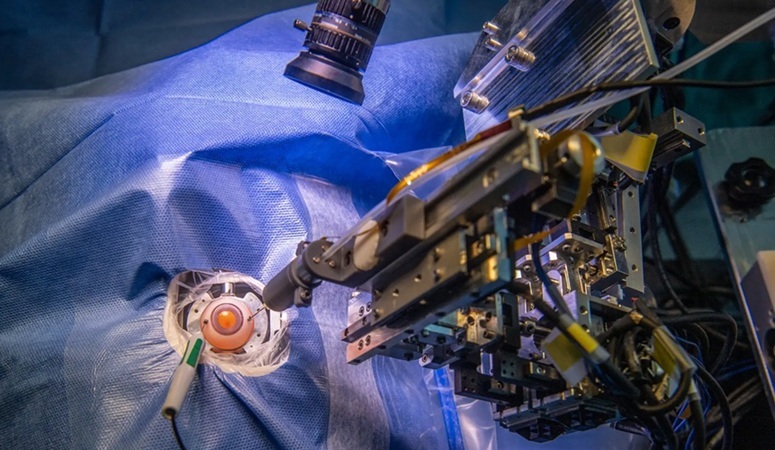Wireless ICM Captures Vital Information
|
By HospiMedica International staff writers Posted on 24 May 2017 |

Image: The world’s first smartphone-enabled insertable cardiac monitor (Photo courtesy of Abbott).
The world’s first smartphone-enabled, insertable cardiac monitor (ICM) provides powerful data to help monitor irregular heartbeats, unexplained syncope, palpitations and suspected atrial fibrillation (AF).
The Abbott Confirm Rx ICM is designed to continuously monitor a patient's heart rhythm and proactively transmit the information via the myMerlin mobile app, allowing physicians to follow their patients remotely and accurately diagnose arrhythmias. Intuitive one-touch indication-based programming and remote monitoring via the Merlin.net Patient Care Network make the technology convenient for clinicians involved in the procedure and follow up based on the secure transmission of patient data.
Available in over 35 languages, the myMerlin mobile app helps patients record their symptoms on their own smartphone and note events such as fainting, or an episode of tachycardia. Patients can also confirm their data was transmitted to their physician and get automatic alerts when they have missed a scheduled transmission, saving the clinic from having to follow up with the patient. The Confirm Rx ICM is expected to undergo a full European release during the second quarter of 2017.
“Incorporating wireless technology directly into our devices enhances the quality of remote monitoring and patient compliance,” said Mark Carlson, MD, chief medical officer of Abbott's cardiac arrhythmias and neuromodulation businesses. “The Confirm Rx ICM addresses a broad range of indications, such as syncope, palpitations and atrial fibrillation. The technology has been designed with robust data privacy and security measures to ensure peace of mind for both patients and providers.”
“The Confirm Rx ICM device will be an important tool for diagnosing patients with suspected arrhythmias, such as those who have experienced fainting or palpitations," said Georg Nölker, MD, head of electrophysiology at Ruhr-University of Bad Oeynhausen (Germany). “The simple insertion procedure and small device size make this technology convenient for both patients and providers. Patients can record symptoms directly on their smartphone without the need for a bedside transmitter or separate activator.”
The Abbott Confirm Rx ICM is designed to continuously monitor a patient's heart rhythm and proactively transmit the information via the myMerlin mobile app, allowing physicians to follow their patients remotely and accurately diagnose arrhythmias. Intuitive one-touch indication-based programming and remote monitoring via the Merlin.net Patient Care Network make the technology convenient for clinicians involved in the procedure and follow up based on the secure transmission of patient data.
Available in over 35 languages, the myMerlin mobile app helps patients record their symptoms on their own smartphone and note events such as fainting, or an episode of tachycardia. Patients can also confirm their data was transmitted to their physician and get automatic alerts when they have missed a scheduled transmission, saving the clinic from having to follow up with the patient. The Confirm Rx ICM is expected to undergo a full European release during the second quarter of 2017.
“Incorporating wireless technology directly into our devices enhances the quality of remote monitoring and patient compliance,” said Mark Carlson, MD, chief medical officer of Abbott's cardiac arrhythmias and neuromodulation businesses. “The Confirm Rx ICM addresses a broad range of indications, such as syncope, palpitations and atrial fibrillation. The technology has been designed with robust data privacy and security measures to ensure peace of mind for both patients and providers.”
“The Confirm Rx ICM device will be an important tool for diagnosing patients with suspected arrhythmias, such as those who have experienced fainting or palpitations," said Georg Nölker, MD, head of electrophysiology at Ruhr-University of Bad Oeynhausen (Germany). “The simple insertion procedure and small device size make this technology convenient for both patients and providers. Patients can record symptoms directly on their smartphone without the need for a bedside transmitter or separate activator.”
Latest Critical Care News
- Pulse Oximeter Index Offers Non-Invasive Guides for Fluid Therapy
- Wearable Patch for Early Skin Cancer Detection to Reduce Unnecessary Biopsies
- 'Universal' Kidney to Match Any Blood Type
- Light-Based Technology to Measure Brain Blood Flow Could Diagnose Stroke and TBI
- AI Heart Attack Risk Assessment Tool Outperforms Existing Methods
- Smartphone Imaging System Enables Early Oral Cancer Detection
- Swallowable Pill-Sized Bioprinter Treats GI Tract Injuries

- Personalized Brain “Pacemakers” Could Help Patients with Hard-To-Treat Epilepsy
- Microscopic DNA Flower Robots to Enable Precision Medicine Delivery
- Origami Robots to Deliver Medicine Less Invasively and More Effectively
- Improved Cough-Detection Technology Aids Health Monitoring
- AI Identifies Children in ER Likely to Develop Sepsis Within 48 Hours
- New Radiofrequency Therapy Slows Glioblastoma Growth
- Battery-Free Wireless Multi-Sensing Platform Revolutionizes Pressure Injury Detection
- Multimodal AI to Revolutionize Cardiovascular Disease Diagnosis and Treatment
- AI System Reveals Hidden Diagnostic Patterns in Electronic Health Records
Channels
Surgical Techniques
view channel
Robotic Assistant Delivers Ultra-Precision Injections with Rapid Setup Times
Age-related macular degeneration (AMD) is a leading cause of blindness worldwide, affecting nearly 200 million people, a figure expected to rise to 280 million by 2040. Current treatment involves doctors... Read more
Minimally Invasive Endoscopic Surgery Improves Severe Stroke Outcomes
Intracerebral hemorrhage, a type of stroke caused by bleeding deep within the brain, remains one of the most challenging neurological emergencies to treat. Accounting for about 15% of all strokes, it carries... Read morePatient Care
view channel
Revolutionary Automatic IV-Line Flushing Device to Enhance Infusion Care
More than 80% of in-hospital patients receive intravenous (IV) therapy. Every dose of IV medicine delivered in a small volume (<250 mL) infusion bag should be followed by subsequent flushing to ensure... Read more
VR Training Tool Combats Contamination of Portable Medical Equipment
Healthcare-associated infections (HAIs) impact one in every 31 patients, cause nearly 100,000 deaths each year, and cost USD 28.4 billion in direct medical expenses. Notably, up to 75% of these infections... Read more
Portable Biosensor Platform to Reduce Hospital-Acquired Infections
Approximately 4 million patients in the European Union acquire healthcare-associated infections (HAIs) or nosocomial infections each year, with around 37,000 deaths directly resulting from these infections,... Read moreFirst-Of-Its-Kind Portable Germicidal Light Technology Disinfects High-Touch Clinical Surfaces in Seconds
Reducing healthcare-acquired infections (HAIs) remains a pressing issue within global healthcare systems. In the United States alone, 1.7 million patients contract HAIs annually, leading to approximately... Read moreHealth IT
view channel
Printable Molecule-Selective Nanoparticles Enable Mass Production of Wearable Biosensors
The future of medicine is likely to focus on the personalization of healthcare—understanding exactly what an individual requires and delivering the appropriate combination of nutrients, metabolites, and... Read moreBusiness
view channel
Philips and Masimo Partner to Advance Patient Monitoring Measurement Technologies
Royal Philips (Amsterdam, Netherlands) and Masimo (Irvine, California, USA) have renewed their multi-year strategic collaboration, combining Philips’ expertise in patient monitoring with Masimo’s noninvasive... Read more
B. Braun Acquires Digital Microsurgery Company True Digital Surgery
The high-end microsurgery market in neurosurgery, spine, and ENT is undergoing a significant transformation. Traditional analog microscopes are giving way to digital exoscopes, which provide improved visualization,... Read more
CMEF 2025 to Promote Holistic and High-Quality Development of Medical and Health Industry
The 92nd China International Medical Equipment Fair (CMEF 2025) Autumn Exhibition is scheduled to be held from September 26 to 29 at the China Import and Export Fair Complex (Canton Fair Complex) in Guangzhou.... Read more














